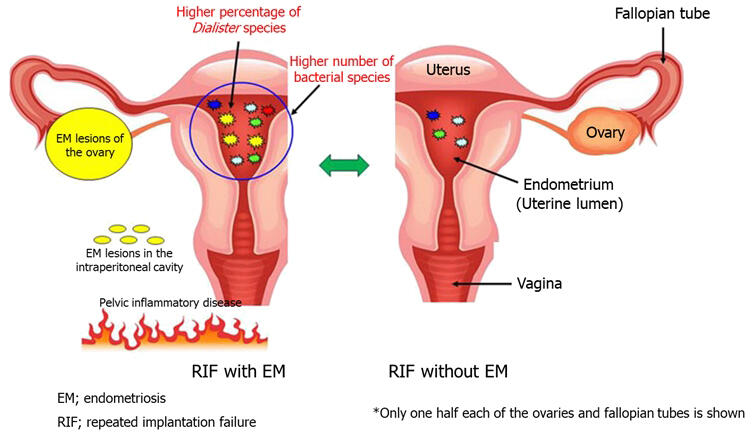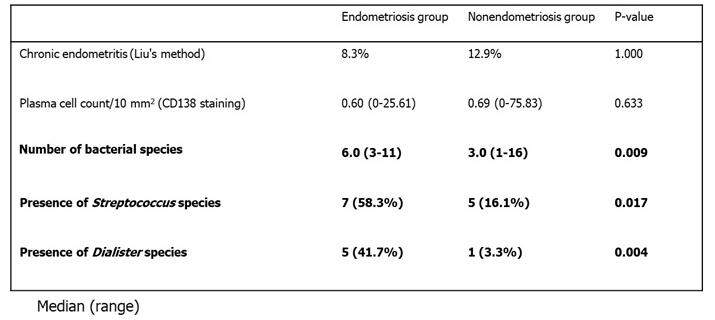A study by the University of Yamanashi and Teine Keijinkai Hospital (Sapporo City) showed that patients with repeated implantation failure, an intractable form of infertility, complicated by endometriosis had more growth of periodontopathic bacteria in the uterus than patients without endometriosis. The etiology of repetitive implantation failure is rarely identified. This study suggests a link between periodontal disease and infertility. Moving forward, they are going to investigate whether treatment and prevention of periodontal disease is effective to improve rates of implantation.
Infertility is defined as the failure to achieve a pregnancy after a certain period of regular unprotected sexual intercourse between a man and a woman who are otherwise healthy and desire pregnancy. Recently, several infertility treatment options, such as artificial insemination and in vitro fertilization, are covered by health insurance. However, in the case of in vitro fertilization, there is a limit to the number of embryo transfers that can be performed under health insurance for each age group. Repeated implantation failure, in which embryos repeatedly fail to implant after transfer in many treatment cycles, is a vexing problem for both physicians and patients, but the cause is rarely pinpointed.
In this study, a research group led by Clinical Assistant Professor Yosuke Ono (Reproductive and Perinatal Medicine), and Professor Osamu Yoshino (Reproductive Immunology) of the Graduate School of Medicine, University of Yamanashi, and Director Hideto Yamada (Perinatal Medicine) of the Center for Recurrent Pregnancy Loss, Teine Keijinkai Hospital, analyzed the uterine microbiome in 43 patients with repeated implantation failure who visited the University of Yamanashi Hospital and Teine Keijinkai Hospital. A small amount of endometrial tissue was collected using a thin stick that could apply negative pressure (an aspiration tube). Genetic analysis of the bacteria in the tissues was performed to compare the microbiome between 12 patients with endometriosis and 31 patients without.

Provided by the University of Yamanashi
The results showed that the group of patients with endometriosis had a higher number of bacterial species. In addition, they found that this group of patients had higher rates of presence of Dialister species, which are periodontopathic and anaerobic, and Streptococcus species. Various bacterial species are involved in periodontal disease. Among them, Dialister species are troublesome in that they are difficult to remove by typical brushing because they are found in deep periodontal pockets of the gingiva. Dialister species are removed with special instruments in a dental office. Streptococcus species are not harmful to healthy hosts but cause various symptoms when the host immunity is compromised.
A more detailed analysis of the relationship between bacteria and endometriosis revealed that among patients with repeated implantation failure, the rate of presence of Dialister species in the subgroup of patients with endometriosis was about 11 times higher than that in the subgroup of patients without. Based on these results, Ono and his colleagues concluded that "changes such as a higher number of bacterial species may worsen the inflammatory state of the intrauterine environment, in which conception takes place, causing implantation failure." However, he also commented "this study did not show if periodontal disease is a cause of repetitive implantation failure. We would like to proceed with research to see if commercially available antibiotics and Lactobacillus preparations can improve infertility."

Provided by the University of Yamanashi
In the field of obstetrics and gynecology, the importance of preconception care to confirm fertility, which refers to have offspring in the future, has been advocated recently. This care checks for endometriosis, polyps in the uterus, adhesions in the fallopian tubes and other organ conditions that may make it difficult to conceive, both physically and mentally. Many medical institutions offer the test under the name bridal check.
Yoshino said, "Preconception care is for 'preparation of the body and mind,' but treatment of periodontal disease may also need to be part of it. Periodontal disease is also considered to be a cause of premature birth, so we would like to continue our research and measure the risk based on scientific evidence."
This study was funded by research grants from the Japan Agency for Medical Research and Development (AMED) and Grants-in-Aid for Scientific Research from the Japan Society for the Promotion of Science (JSPS). The results were published in the electronic edition of the Journal of Clinical Medicine on August 7 and announced by the University of Yamanashi on August 22.
Original article was provided by the Science Portal and has been translated by Science Japan.




